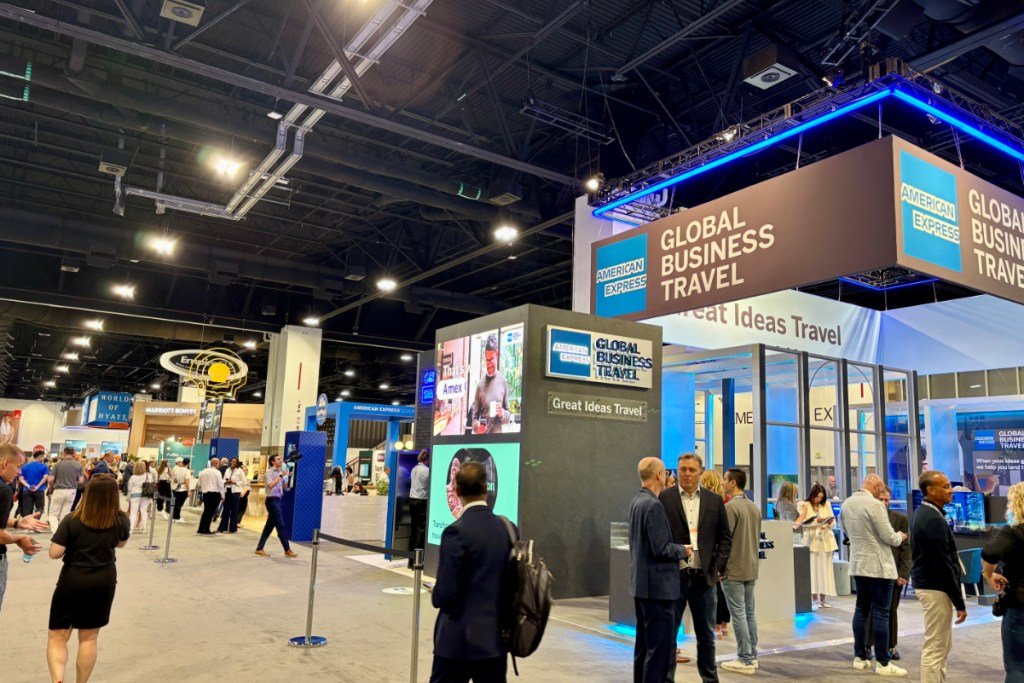AI in Travel
Report: 95% of APAC travellers eager for AI

95% of APAC travellers are excited about AI’s role in travel, according to Booking.com’s inaugural “Global AI sentiment report”, launched at its Trust Summit 2025 in Singapore.
Based on insights from over 37,000 consumers across 33 markets, the study explores how people are using, trusting, and responding to AI in everyday life, and increasingly, in travel. The findings revealed that APAC consumers are not only familiar with AI (82%) but eager to integrate it into their future travel experiences, with 93% indicating they plan to use it in trip planning.
While enthusiasm is high across APAC, the report also identified nuanced sentiments towards AI. About 41% of respondents in the region identify as “AI Enthusiasts”, those curious about AI’s potential, while only 15% are “AI advocates”, people who support its benefits and responsible use.
Don’t miss: Study: 90% of APAC luxury travellers book with wellness in mind
Meanwhile, 8% said they were cautious about AI’s development, and 6% were classified as “AI skeptics”. Notably, 16% of respondents identified as “AI detractors”, suggesting that hesitancy around AI adoption remains present.
Globally, regional sentiment varied. Latin America leads in AI excitement (98%) and familiarity (89%), while APAC follows closely behind. In contrast, consumers in North America and Europe were more cautious, with higher levels of distrust in AI-generated content (32% and 29% respectively).
Despite widespread usage, 98% of global respondents reported using AI-powered search tools, and 83% said they had engaged with generative AI, trust remains limited. Only 8% said they fully trust AI, and just 16% are comfortable with AI making decisions on their behalf. Most users still prefer AI as a supportive tool rather than an autonomous one.
Travel emerged as a key area of AI integration. Globally, 75% of travellers have already used AI in planning or while on a trip, with APAC respondents especially open to autonomous trip planning (67%). AI is most commonly used for destination research, language translation, and navigating transport systems.
Booking.com also noted growing trust in AI assistants, particularly over influencers or peer recommendations, and increasing demand for AI to support more responsible travel. Respondents said they were interested to see AI tools help avoid crowded tourist spots and promote experiences that benefit local communities.
“Generative AI represents one of the most significant technological shifts of our era, opening up new possibilities across industries, including travel. At Booking.com, we’ve been at the forefront of AI innovation for a decade, integrating machine learning and AI to enhance the customer journey at every touchpoint, simplify complexity, inspire curiosity and empower people to shape journeys that feel truly personal,” said Laura Houldsworth, managing director for APAC at Booking.com.
She added, “As travellers across APAC look for deeper meaning and connection in every trip, whilst planning their travels with ease, AI is helping to unlock more intuitive and imaginative travel experiences than ever before.”
The findings come as more travel brands in the region begin doubling down on AI investments to meet rising consumer expectations. Most recently, Singapore Airlines (SIA) has partnered with OpenAI to roll out advanced generative AI tools across its business, the first such collaboration between the ChatGPT-maker and a major airline.
The tie-up will see OpenAI’s multimodal capabilities, including text, audio, video, and image interpretation, integrated into SIA’s customer-facing platforms and internal operations. First on the runway: an overhaul of its AI-powered virtual assistant, which will soon offer smarter, more personalised travel planning and destination discovery tools.
Accelerate your brand’s growth with AI-first strategies, emerging tech and data-driven experiences. Join 500+ marketing leaders at Digital Marketing Asia 2025 Singapore on 24–25 September to uncover transformative trends, real-world wins and powerful ideas for 2025 and beyond.
Related articles:
Study: 81% of APAC shoppers want AI-powered shopping tools
Study: 63% of APAC AI shoppers say the tech sparks better ideas
Study: 73% of SEA shoppers say yes to AI but still want human support
AI in Travel
Revival of Ansett Australia with AI – What You Need to Know

Saturday, August 2, 2025
The Revival of Ansett Australia has taken a surprising turn, formerly one of the leading airlines in Australia has made an incredible comeback – albeit not as a full-service airline. The reintroduction of the airline was conceived by Melbourne entrepreneur, Constantine Frantzekos who saw an opportunity to reinvigorate the Ansett name and offer a more tailored and cost-effective means of flying, Through the platform, known as Ansett. Travel, powered by cutting-edge artificial intelligence, Frantzekos aims to transform how Australians plan and experience travel, bringing back the legacy of Ansett in a modern, digital form.
From Airline to AI Travel Platform
Launched many decades ago Ansett quickly became a household name and was most noted for its innovative flight experience coupled with world-leading customer service. But after it folded in 2001, the brand appeared to never fly again. But Frantzekos spied an opportunity in the moldering trademark, which had expired. Rather than siphoning the defunct airline’s DNA, he rebuilt the brand as an ultra-modern travel tech platform that prides itself on deep personalization and machine learning to serve 21st-century travelers’ changing needs.
AI-Driven Personalization for Modern Travelers
Ansett. Travel, Australia’s first travel agency wholly powered by A.I. The platform seeks to provide a more intelligent and personalized experience by mining users’ preferences using algorithms and machine learning. The AI makes personalized travel recommendations for trips, activities and experiences over time — it’s like your own personal travel concierge in the cloud. Users enter information about their travel experience — like the location, dates and interests at play—and an AI powered program conjures up bespoke itineraries, activities and amenities for them.
For instance, a user could plan for having their mate from Melbourne visit them to watch a major sports event such as the Ashes. The AI would then suggest things to do in the area and local accommodations/restaurants that suit their tastes. Private Charter Members also get the benefit of buying these services at very close to wholesale on Ansett VIP.
An Affordable Business Model Focused on Savings
The business model behind Ansett. Travel is based on two pillars, deep personalization and affordability. Users can enroll in a VIP membership for $99 per year, which entails discounts on flights, hotels and cultural experiences. The platform is planned to provide dramatic savings when compared against old fashioned travel agencies that are expensive in terms of overheads and staff. Instead, Ansett leverages technology to automate all of its operations and invests capital into building a platform while keeping a tiny support team.
Ansett is not a traditional travel agency, which can take the bulk of a dollar when it sells and then enjoys large profit margins. The website intentionally makes their pricing more competitive for travelers and leaves the difference in savings right up on company’s frontpage.
Combining AI with Human Support
Frantzekos draws parallels between Ansett. Travel and companies like Uber, which have bet on personalized service without traditional overhead. The service features a Chrome and Firefox extension (with Safari support coming) that lets consumers compare real-time prices on travel products while visiting other sites.
Despite being AI-driven, Ansett. Travel also reminds you how essential human contact is. With AI responsible for the majority of routine personalization duties, customer support agents can be on hand to help users when there are specific problems or they need assistance urgently. It is this melding of AI efficiency and human hospitality that makes for a smoother travel experience.
What Next, The Future of Ansett
While Ansett. Travel isn’t an airline, but Frantzekos says he wouldn’t rule out possibly branching the brand into air travel in some way down the line. For now he wants to give every Australian access to a next-level travel concierge that aspires on the nostalgia of Ansett with modern AI power. Ansett Australia is reborn in the Digital world, not flying but at the forefront of a new era, transforming travel using blockchain technology.
AI in Travel
Ex-Concur Founder Eyes “Perfect Trip” With New Startup Spotnana

Steve Singh spent two decades building Concur into the dominant travel-and-expense management platform before selling it to SAP for $8.3 billion in 2014. A year ago he became CEO of Spotnana, a startup that aims to solve the industry’s lingering problems.
The travel technology sector has struggled for years with fragmented systems that force companies to cobble together bookings from multiple sources while maintaining adequate customer service.
These back-end issues have delayed the arrival of what Singh called “The Perfect Trip” in an interview with Skift in 2014.
Now Singh argues that today’s cloud-native computing and machine learning can solve problems that proved intractable when he first tackled them at Concur more than 40 years ago.
“I haven’t been this excited about how tech can improve the corporate travel experience since mobile phones became widespread,” Singh said in an interview at Global Business Travel Association conference in Denver last month.
Automating Services
Spotnana’s approach centers on automating routine travel services like rebookings and refunds.
For corporate customers buying the travel, Spotnana will offer business intelligence tools and analytical services to let executives more clearly understand what their employees are spending on travel.
“Instead of a 15% cut across the board, which is indiscriminate, what if an AI agent could say, ‘I’ll get you the 15% savings by reducing travel spend by 40% for people that are not revenue producing while not reducing it at all for others, thanks to the intel I know on the clients they’re visiting and the productivity of those employees on the road,’” Singh said.
Singh claimed Spotnana could reduce travel management companies’ operational costs by roughly half. The tech vendor said it doesn’t accept global distribution system incentives and doesn’t hide or bias content to reach supplier volume targets.
Singh said Spotnana expects to deploy its AI agent capabilities within the next two to three years.
He described plans for “an AI agent that was trained on, say, your top 10% of your corporate travel agents” that could provide consistent, scalable service while understanding individual traveler preferences and company policies.
“Imagine an AI agent that not only knows me and my corporate policies and my personal preferences, but then it can also be an expert in every city I want to go for work or for leisure,” Singh said. “That starts to deliver a client experience that is no different than the world’s best executive assistant.”
Singh said that AI may also help with either predicting and responding in the moments when trips are disrupted by cancellations.
Automated reactions are key, he said: “If my flight is delayed, I shouldn’t have to pick up my phone and call somebody to change flights. Why can’t there be a recommendation pushed right into my app, saying here are the three options within your company’s travel policy, here are the three options outside your policy. Which one would you like?”
Frenemies
Spotnana, which has disclosed raising over $100 million in funding, faces established competitors with services that overlap.
While Spotnana is not a travel management company, its technology and full-content approach are similar to travel management companies like Navan (which has raised over $1.2 billion in funding) and TravelPerk (over $700 million).
Yet some industry observers remain skeptical about whether new technology can overcome the travel sector’s entrenched interests and complex commercial relationships. The American Airlines’ ill-fated effort to change how corporations and travel management companies book business travel suggests the challenges facing any attempt to change distribution.
But Singh said cloud computing costs are “one-tenth” of what they were 15 to 20 years ago. Key corporate travel systems are now cloud-native and use modern APIs, or data exchange methods.
More importantly, suppliers, buyers, and travel management companies have greater incentives to change the status quo, he said.
Spotnana offers its tech to Direct Travel, a company Singh also backs, and other travel management companies, such as Solutions Travel. It works with corporate buyers via connections with their preferred travel management companies.
Yet Spotnana is also a tool for the suppliers themselves.
“We think there’s multiple tiers of opportunity with our supplier partners,” Singh said. “One is the content distribution to travel management companies. But the other is that most of our supplier partners also want us to build other services for them.”
Spotnana’s effort to be all things to all people could get dicey if travel management companies come to fear it as potentially siphoning off their business by competing on fees and services to woo buyers.
Singh said he sees Spotnana’s opportunity with suppliers as being in providing services that travel management companies typically don’t, such as by giving suppliers deeper insights into their customers.
A case in point: Spotnana has partnered with Marriott to power the hotel chain’s small business portal, Business Access, handling both content distribution and booking management.
“We’re taking advantage of the biggest transformation I’ve seen in travel since we moved from paper based tickets to digital,” Singh said.
AI in Travel
Webuy Global Closes $3 Million Offering to Boost AI Travel Platform

Elevate Your Investing Strategy:
- Take advantage of TipRanks Premium at 50% off! Unlock powerful investing tools, advanced data, and expert analyst insights to help you invest with confidence.
Webuy Global ( (WBUY) ) has issued an update.
On August 1, 2025, Webuy Global Ltd successfully closed a securities purchase agreement initiated on July 30, 2024, raising approximately $3 million through the sale of Class A ordinary shares and pre-funded warrants. The proceeds are earmarked for developing an AI travel assistant platform, AI-integrated travel hardware, and general working capital. This strategic move is expected to enhance Webuy’s market position in the Southeast Asian e-commerce and travel sectors, potentially benefiting stakeholders by expanding the company’s technological capabilities and service offerings.
Spark’s Take on WBUY Stock
According to Spark, TipRanks’ AI Analyst, WBUY is a Underperform.
Webuy Global’s overall stock score is low due to significant financial challenges, including inconsistent revenue growth, high leverage, and negative cash flow. Technical analysis supports a bearish outlook, and the negative P/E ratio further underscores valuation concerns.
To see Spark’s full report on WBUY stock, click here.
More about Webuy Global
WEBUY GLOBAL LTD is a technology-driven company transforming community e-commerce and travel across Southeast Asia. The company utilizes predictive AI, personalized recommendations, and community-led engagement in its group-buy model, while its travel vertical offers curated itineraries and real-time support through its proprietary AI Travel Consultant.
Average Trading Volume: 2,001,681
Technical Sentiment Signal: Strong Buy
Current Market Cap: $4.32M
For an in-depth examination of WBUY stock, go to TipRanks’ Overview page.
-

 Brand Stories2 weeks ago
Brand Stories2 weeks agoBloom Hotels: A Modern Vision of Hospitality Redefining Travel
-

 Brand Stories7 days ago
Brand Stories7 days agoCheQin.ai sets a new standard for hotel booking with its AI capabilities: empowering travellers to bargain, choose the best, and book with clarity.
-

 Destinations & Things To Do2 weeks ago
Destinations & Things To Do2 weeks agoUntouched Destinations: Stunning Hidden Gems You Must Visit
-

 Destinations & Things To Do7 days ago
Destinations & Things To Do7 days agoThis Hidden Beach in India Glows at Night-But Only in One Secret Season
-

 AI in Travel2 weeks ago
AI in Travel2 weeks agoAI Travel Revolution: Must-Have Guide to the Best Experience
-

 Brand Stories4 weeks ago
Brand Stories4 weeks agoVoice AI Startup ElevenLabs Plans to Add Hubs Around the World
-

 Brand Stories3 weeks ago
Brand Stories3 weeks agoHow Elon Musk’s rogue Grok chatbot became a cautionary AI tale
-

 Asia Travel Pulse4 weeks ago
Asia Travel Pulse4 weeks agoLooking For Adventure In Asia? Here Are 7 Epic Destinations You Need To Experience At Least Once – Zee News
-

 AI in Travel4 weeks ago
AI in Travel4 weeks ago‘Will AI take my job?’ A trip to a Beijing fortune-telling bar to see what lies ahead | China
-

 Brand Stories4 weeks ago
Brand Stories4 weeks agoChatGPT — the last of the great romantics













You must be logged in to post a comment Login